COLUMBIANA, Ohio — In the days after World War II, everyone, it seems, was trying to figure out how to help war-devastated people get back on their feet.
One of the programs we’ve now long forgotten was a unique partnership between governments and churches that recognized the role livestock played in rebuilding lives.
Rebuilding with horses
Between 1945 and 1947, the United Nations Relief and Rehabilitation Administration and the Brethren Relief Center of the Church of the Brethren organized approximately 360 shipments of livestock — mostly horses, heifers and mules — to war-torn countries.
Back then, farm boys from Ohio didn’t think of themselves as “cowboys,” but that’s exactly what Ralph Witmer and his three cousins became for a month in late 1946. They joined the “seagoing cowboys,” part of the 7,000 men who crossed the Atlantic Ocean to deliver livestock — more than 300,000 animals by the end of the program.
The program disbanded in 1947, but the original Brethren organizers forged on, and the relief efforts grew into what is today Heifer International.
Getting involved
Witmer, then 19, joined his first cousins, now deceased, Vernon Witmer, then 21, Howard Weaver, 20, and Paul Weaver, 23, aboard the Beloit Victory sailing out of Newport News, Rhode Island, Nov. 27, 1946, bound for Danzig (now Gdansk), Poland. Their job as these seagoing cowboys was to take care of the 700 horses during the voyage.
“We’d read so much about the destruction,” Witmer says of their motivation. They received no special training, but, as he puts it, “We knew how to feed horses!”
Witmer was one of the few who didn’t get seasick on the 11-day trans-Atlantic trip (about a quarter of the cowboys were so sick, they couldn’t work), so his days were busy. When they arrived in Gdansk, they unloaded the horses — and manure — and after they put them in a corral, their official duties were complete. The horses and mules were given to farmers and other residents who needed them for work or transportation.
The horses were a valuable gift, Witmer says. “You had to have them. Without a horse, on the farm at that time, what could you do?”
The cousins were free until their ship left, so they explored the bombed-out city.
“You get numb to what you see,” Witmer admitted. He remembers seeing “so many orphans,” many who slept out in the open, even during the winter, finding some cover in huge hay piles at the edge of town. “I don’t know what they did for food.”
Extended trip
One day, the four traveled the 36 miles to Gdynia, Poland’s largest sea port, but 15 minutes after they left, the sign was posted that their ship was to leave within 24 hours. They arrived back in Gdansk to discover they had missed their boat, and were stranded with no passports, no supplies, and no clothes other than what they were wearing. They had about $15 between them. They found cover in the home of a Polish seaman and slept on the floor.
It was a nerve-wracking 30 days, with trips to the American consul and every ship with a U.S. destination, but they finally got spots on a returning vessel.
“If we hadn’t gotten on that ship, I don’t know what would’ve happened,” Ralph Witmer says today.
Back in U.S.
When Witmer returned to Ohio, he came back to the family’s Columbiana County farm, then went into a partnership with his cousin Paul Weaver with a combine. He subsequently built his father’s farm equipment business, now known as Witmer’s Inc., an AGCO dealership.
Fast forward to 2015. Witmer, now 88, had always wanted to return to Poland, to see the country rebuilt and not as the ravaged buildings he saw in 1946. There’s an opportunity to attend the AgriTechnica farm show in Germany, he told his son, Nelson, who is the president of Witmer’s Inc. We should go, and extend our trip with a visit to Poland.
“Growing up, we had always heard his stories,” said Nelson Witmer, “and Dad always wanted to go back. When he said something to me about this trip, I thought ‘I’m too busy, blah, blah.’ But when I went home and talked to my wife, she said, ‘ You HAVE to go.’”
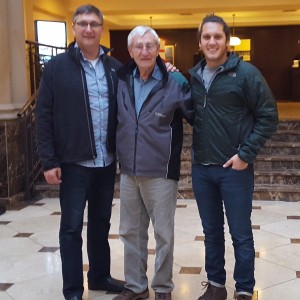
It turns out three generations of Witmers returned to Poland, as Nelson’s 23-year-old son Alex also went along. They attended the AgriTechnica show Nov. 3-4, as part of an AGCO dealers and customers tour, and then toured the Fendt factory, and visited Hanover and Frankfort.
“We were kept so busy in Germany that I didn’t have much time to think about what was coming in Poland,” Nelson Witmer wrote in a post-trip commentary for their family. “We boarded the plan in Frankfurt with anticipation, questions and a sense of going back — not only to learn the history of war-torn Poland, but to meet Dad as a 19-year-old Mennonite volunteer and to see how these events impacted him and helped shape his life.”
Treated like royalty
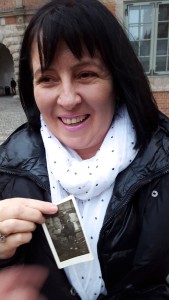
In Poland, the Witmers’ host was Hildrun Mathies, a professional tour guide from Munich who was also a personal friend. Mathies arranged for a local guide and interpreter, Margaret Popis, who had a personal connection to this assignment, as her grandfather had received one of the horses given by the UNRRA effort.
Her grandfather had lost two homes in the countryside to bombing, but as a builder, he wanted to help rebuild Gdansk. With very little other than his hands and a cart — and now a horse from the Americans — he joined the process of cleaning up the rubble and rebuilding his city.
Nelson said when Margaret met Ralph Witmer, she showed him an old photograph of her grandfather astride that horse, and, with visible emotion, hugged Ralph and said “Thank you, for my grandfather.”
Unbeknownst to the Witmers, a worker at the Gdansk tourist bureau, had arranged a reception in their honor, attended by officials who were eager to meet the first American “seagoing cowboy” to return to their city. Joining the group were journalists, residents who remembered the horses coming the Poland, city officials, and others. The mayor presented Ralph with a book and medal that declared him an official “Lover of Gdansk.”
It was, the Witmers say, an emotional time of laughter and tears, and pride. “All of a sudden, this country boy was a hero,” Ralph said.
They sailed in the harbor and stopped in an older industrial area of the harbor — the exact spot where the horses were unloaded
During their brief stay in Gdansk, an older gentleman stopped Ralph after hearing his story. His father, too, had received a horse, and as he thanked Ralph, he presented him with a Polish flag.
Nelson remarked to one of the group that he felt bad that they hadn’t brought any gifts in return. She replied, “No, no, please, your gift was given many years ago.”



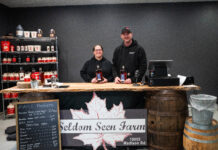
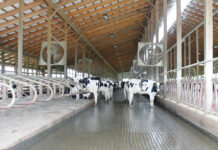


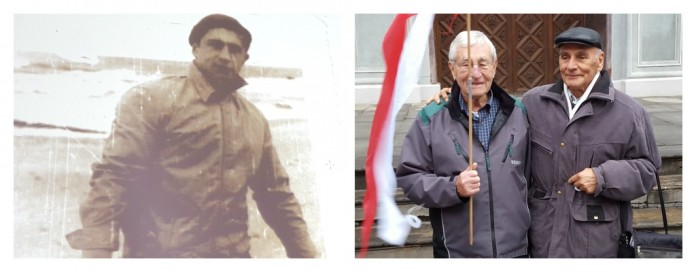




Wonderful story, Miss Susan. It warms my heart (in many ways) since I am an American, whose heritage is from Poland on both sides of my family. I am one of the millions of last names of “…skis” in the US.
Funny, isn’t it? As an old farmer myself, I remember raising Percherons and Belgians “back in the day.” These gentle giants really helped out back then, both in the US and Europe! (Our Amish friends still use them.)
What a marvelous adventure this has been for their entire family! Great story.
Thanks! There’s so much more to that whole relief effort that I could’ve written volumes about.
What a wonderful story. I had never heard of this particular program, and I imagine there are many more war-rebuilding programs that have been forgotten. My Father was a WW II Purple Heart Vet, and he didn’t talk about the war very often, especially when I was a young child. He died last last year at the age of 95, and with his passing, so many stories are now gone, too. And this is being repeated daily as more Vets die. These are the kind of stories that should be told to the young generation, to remind them about the bravery and selflessness that our parents and grand parent gave to our Country and other Countries as well, and most of all, not expecting anything in return.
Susan, Thank you for this wonderful article on Ralph Witmer’s experience as a seagoing cowboy to Poland! I’ve been researching this history since 2002, and Ralph is one of the cowboys I interviewed several years ago. His story is certainly one of the gems of the many I’ve heard, having missed his ship and being in a strange land with so little resources. I just can’t imagine!
My grandfather was also a seagoing cowboy to Poland. In 2013, I had the opportunity to go to Gdansk and see where he and the many other cowboys who went there had been. Two of the women in the closing photo of your article were my contact persons, Magda and Grace. They were so taken with the seagoing cowboy story and with the copies of images I had with me from seagoing cowboy albums of places I wanted to identify, that they arranged for a newspaper and TV interview while I was there; so I can only imagine how excited they were to have made Ralph’s acquaintance and met one of the seagoing cowboys. Grace learned after I left that her grandmother had also been one of the recipients of an UNRRA heifer. The sharing of history is a powerful thing. Thank you for sharing Ralph’s story! I’ll pass it along on my blog.
Thank you, Peggy. Your website was also an invaluable source of information for me. What a labor of love, and what a gift you have shared with the rest of us. Thank you for that work!
Is there a website showing ALL participants? Our late church member (Presbyterian Church of Ruston,LA) EDWIN CAROTHERS shared a little of his experience escorting horses to Yugoslavia? right after WWII. Wished he were here now to read of the seagoing cowboys! Thanks you. Mary H.
Mary, hello! I can answer your question. No, there is no listing on the internet of all the seagoing cowboy participants. I do have a database of the card file of seagoing cowboys, but it is not ready to be posted, as yet, on my seagoingcowboys.com website. I can tell you, though, that Ed Carothers was on S. S. Zona Gale that left New Orleans February 11, 1946, for Trieste, Italy, where the animals were sent on to Yugoslavia via rail. If you have questions about others who may have been cowboys, let me know. ~Peggy